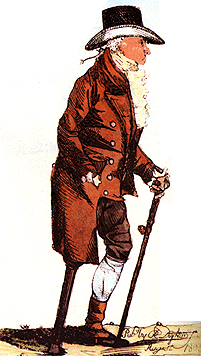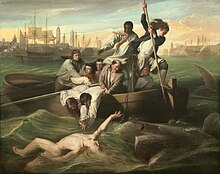Brook Watson, 1st Baronet
Sir Brook Watson, 1st Baronet (born February 7, 1735 in Plymouth , † October 2, 1807 in London ) was a British merchant, soldier and Lord Mayor of London . He was best known for the painting Watson and the Shark by the painter John Singleton Copley from 1778, which shows how Watson is attacked by a shark as a boy .
Early years
Brook Watson was the only son of John Watson and his wife Sara. In 1741 he was orphaned and sent to live with his uncle and aunt in the United States in Boston . The uncle was a merchant who traded in the West Indies . Watson soon showed a particular interest in seafaring and his uncle had him hired on one of his ships. In 1749, Watson was swimming in Havana harbor when he was attacked by a shark. The animal bit twice and injured the boy's right leg so badly that it had to be amputated by other crew members after it was rescued . Watson was hospitalized for three months and recovered.
Military career
When Brook Watson returned to Boston, it was found that his uncle was bankrupt . In 1750 he took a job with Andrew Huston, who traded with the French and the Indians. In Fort Lawrence he met Robert Monckton in 1752 and became his secretary, and from 1755 he was together with this commissioner ( commissary ) at the battle of Fort Beauséjour . Three years later he was sent to oversee the deportation of the Acadians from Baie Verte . In 1758 he was Commissary under General James Wolfe at the siege of Louisbourg .
Career as a businessman
In 1759 Brook Watson went to London to pursue his commercial career. He became very successful as he had several partnerships with business people in Canada. He was involved in shops in London, Montreal and Boston , among others, and traded in fish, hides and wood, among other things. In 1763 he received a land grant from the government of Nova Scotia in County Cumberland , which had been founded four years earlier. At the beginning of the 1770s he was the most important merchant in Nova Scotia. His collaboration with Governor Guy Carleton was particularly close . When Carleton used Watson as part of a lawsuit against Chief Justice Peter Livius , but Livy ruled against Watson, Livy was immediately removed as judge.
Watson became a member of the founding committee of Lloyd's of London in 1772 and later chaired it for ten years. He combined his commercial affairs with activities for the government. Before the American Revolutionary War , he visited Massachusetts , New York and other colonies. During this time he intercepted letters to the British General Thomas Gage , which were supposed to prove that Gage was a spy. The American writer William Dunlap called Watson a "traitor" who flattered himself with many important Americans in order to learn as much information as possible about their plans and to pass them on to his "chosen masters".
In November 1775 Brook Watson accompanied the American freedom fighter Ethan Allen as a prisoner on a sea voyage from Canada to England. Allen wrote of the trip that it was “placed in the hands of an English merchant from London, whose name was Brook Watson; a man of vicious and cruel character, perhaps fanned in the exercise of his viciousness by a clique of Tories who sailed with him to England. "
In 1775, Watson was interviewed by the House of Commons when debating Lord North's law prohibiting New Englanders from fishing in the North Atlantic . In 1782 he served as Commissary General in the Army, commanded by Sir Guy Carleton , and now oversaw the resettlement of loyal British subjects in the same area, 30 years after overseeing the eviction of the Acadians.
Watson as a politician
Upon his return from London, Brook Watson was elected Alderman of the City of London. From 1784 to 1793 he was a member of the House of Commons for the City of London. He was also sheriff of London and Middlesex in 1785 . From 1786 to 1794 he was on behalf of Carleton the representative of New Brunswick in London and from 1793 to 1795 Commissary-General of the Duke of York at Albany in Flanders .
In 1796 Watson became Lord Mayor of London. From 1798 to 1806 he served as Commissary-General of England. He was also director of the Bank of England from 1793 to 1794 and from 1796 to 1806 . In 1797 he was appointed Colonel of the London Regiment of Militia Cavalry ( Yeomanry ).
A satirical poem reflects the opinion of Brook Watson's political enemies:
-
Oh! Had the monster, who for breakfast ate
-
That luckless limb, his noblest noddle met,
-
The best of workmen, nor the best of wood,
- Had scarce supply'd him with a head so good.
Watson and the Shark
It was around 1774 that Brook Watson met the painter John Singleton Copley, and Watson commissioned the painter to create a painting known as Watson and the Shark, which was completed in 1778. The painting was exhibited at the Royal Academy that same year and caused a sensation. Watson left the picture to his wife on condition that after her death it be given to Christ's Hospital in London, where it was to be hung in the entrance hall. In 1963 the hospital sold the painting to the National Gallery of Art in Washington .
Marriage and titles of nobility
1760 married Brook Watson Helen Campbell, the daughter of a goldsmith of Edinburgh . On December 5, 1803, Watson was awarded the hereditary title of Baronet in the Baronetage of the United Kingdom , of East Sheen in the County of Surrey . Since his marriage remained childless, the award was made with the special addition that the title, in the absence of male descendants of his own, was inheritable to his great-nephews William Kay († 1850) and Brook Kay (1780–1866) and their male descendants. At Watson's death in 1807, the former inherited the title accordingly.
Individual evidence
- ↑ a b c d e f L. FS Upton: "Watson, Sir Brook" on Dictionary of Canadian Biography Online
- ^ William Dunlap: History of the rise and progress of the arts of design in the United States , Volume 1 1834, p. 117 (accessed June 26, 2011).
- ↑ Original text: Allen wrote that he "was put under the power of an English Merchant from London, whose name was Brook Watson: a man of malicious and cruel disposition, and who was probably excited, in the exercise of his malevolence, by a junto of tories, who sailed with him to England ... "
- ↑ Ethan Allen : Capture of Ticonderoga 1849, p. 17 (accessed June 28, 2011).
- ^ Incidents in the life and ministry of the Rev. Alex. RC Dallas
- ↑ Translation follows.
literature
- Ethan Allen: A Narrative of Colonel Ethan Allen's Captivity, Written by Himself , 3rd Edition. Burlington, Vermont 1838
- Margaret Jeffery, "A Painting of Copley's English Period". In: The Metropolitan Museum of Art Bulletin, New Series December 1942. 1 (4): 148-150.
Web links
- Watson and the Shark . National Gallery of Art, Washington DC. 2006. Retrieved November 12, 2006.
- The National Portrait Gallery, London: six versions of portraits of Watson . Retrieved December 15, 2006.
- Biography in the Dictionary of Canadian Biography Online
- Brook Watson on historyofparliamentonline.org
| predecessor | title | successor |
|---|---|---|
| New title created | Baronet, of East Sheen 1803-1807 |
William Kay |
| personal data | |
|---|---|
| SURNAME | Watson, Brook, 1st Baronet |
| BRIEF DESCRIPTION | British merchant, soldier and Lord Mayor of London |
| DATE OF BIRTH | February 7, 1735 |
| PLACE OF BIRTH | Plymouth |
| DATE OF DEATH | October 2, 1807 |
| Place of death | London |

